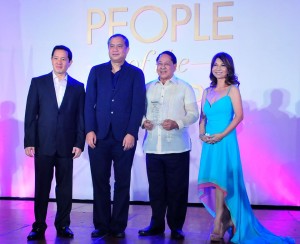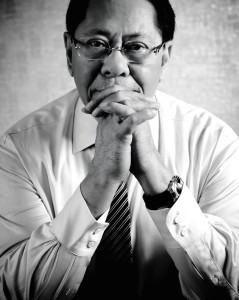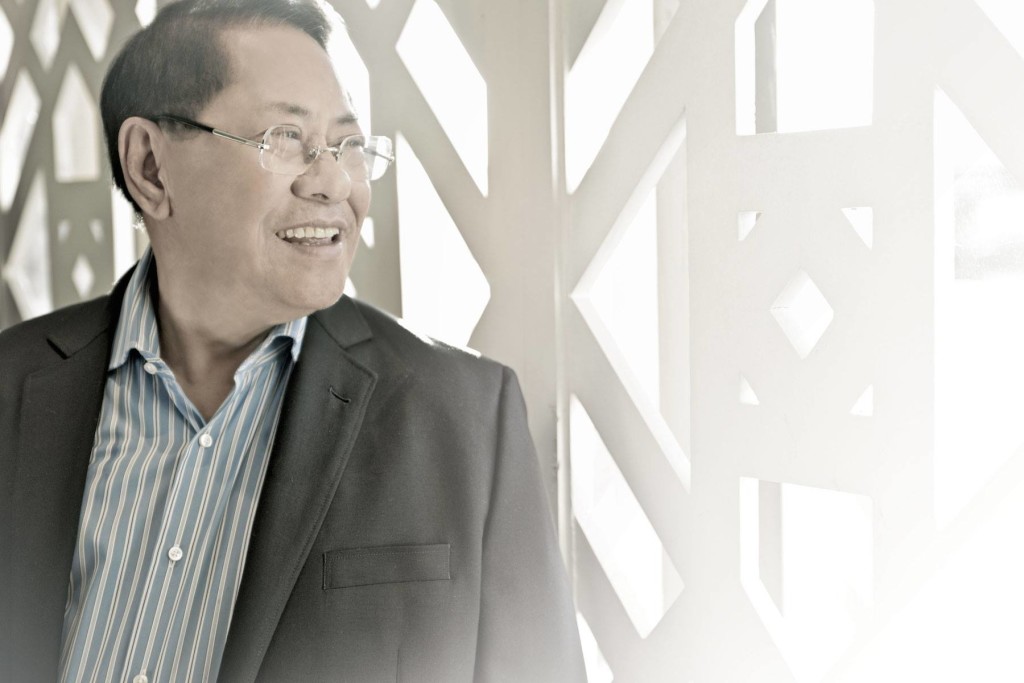(Editor’s Note: In 2011, Sen. Ed Angara was chosen as a “People of the Year” Awardee for his achievements both as a public servant and a private individual. We look back at the man in this story by Kap Aguila-Maceda, through the lenses of Frank Hoefsmit.)
The longest-serving senator in the post-EDSA Senate, Sen. Edgardo Javier Angara authored laws that dramatically changed the lives of all Filipinos — “from womb to tomb.”
For if he had his druthers, Angara would have confined himself to a private practice in law. But then President Corazon Aquino would have none of that. Really.
Indeed, it seems impossible to imagine a Senate without “Edong,” even if it could have happened. What a tragedy that would have been not to have the author of, according to an online resource, “landmark laws on agriculture, education, health, arts and culture, science and technology, good governance, financial reforms and social welfare, including the Free High School Act, National Health Insurance Act, Senior Citizens Act, Agriculture and Fisheries Modernization Act and Renewable Energy Act.”
Since being prevailed upon by Mrs. Aquino to run for the Senate in 1987, Angara has been its longest-serving senator post-EDSA. But don’t get him wrong. The desire to serve in public has always been in the gene — and in the cards.
“I started my public service when I was elected to the Constitutional Convention way back in the ‘70s,” Angara shares. “Of course I already had a natural liking to politics because my father was mayor, my great grandfather was the barangay captain of his town. It’s in the blood.”
But what riveted Angara’s attention and firmed up his decision to participate in the process was what he calls “a great opportunity.” He underscores: “I would become a founding father of my country. And they said, this was non-partisan and political parties were prohibited from sponsoring — so even greater! We also did not have to spend any sum which was great because I had no money. So I did run but I was aghast because people asked me for money even if it was for an honorary ticket position. There’s nothing in the law that made it possible for us to be paid in the Convention. All I know is that we’re just going to work and your reward is to be a potential father of the country.”
Suffused perhaps with equal doses of naivete and idealism, Angara saw past the honor of being elected, fretted and obsessed on what he didn’t like — that people expected their politicians to give them money. “It was a baptism of fire for me. I was elected in Quezon,” he narrates. “At that time, Quezon only had two districts. Quezon then started in Isabela down to Camarines Norte. That’s practically the whole land of Luzon. And that’s how far and how long you go up and down campaigning. I won; I was top of 30 candidates. After that I said, no. I will never seek elective position again because I think if people will ask you for money, that’s not a good thing at all.”
Already a lawyer then, Angara opted to turn his back (for good, it seemed) on public service in favor of private practice. “I said I would just devote myself to my career, and try to be the best lawyer in town. So I decided to establish my own law firm,” he says.
Private success
Establish it he did. Since 1972, the Angara Abello Concepcion Regala & Cruz Law Offices (ACCRA Law) has reputedly become the country’s largest (and among the most respected) practice. Today, over 100 lawyers and an almost equivalent number of non-legal personnel call it home.
Owing to the success and reputation of ACCRA Law, Angara was elected to the presidency of the ASEAN Law Association. “That’s good because that (reflects) a judgement of peers,” he says.
From there, Angara subsequently found himself being considered for the presidency of the University of the Philippines Board of Regents. Of it, he says he “had no inkling at all,” insisting “I did not pursue being an educator as a career.”
The senator feels it was offered to him because they appreciated his performance as a lawyer. “They said, this guy must have good managerial ability. And they were looking exactly for a managerial guy to run the university,” he volunteers.
Nonetheless, Angara narrates he was initially “hesitant” even if he saw it as a good way to serve the country. “The UP students and faculty were suspicious of me because I started my law career in the office of then Defense Secretary Juan Ponce Enrile,” he shares. The activists of the State University certainly did not appreciate the Marcos connection.
He enthuses: “People in UP were a little naughty; they saw me as the right hand of Enrile. And I was really unknown in the academe. But I soldiered on and, in the end, I think, the whole community accepted me because I effected really, really wide-ranging change in the university — in the curriculum, in physical appearances, in pay. I think I improved the morale of the faculty, students and staff as a whole.”
Angara served from 1981 to ’87 — the year President Cory Aquino conscripted him to join the senate race. “When I left, it was with a little sadness,” admits the senator. “Cory called me in late January and said ‘Ed, I’d like you to run for the Senate to represent education.’ She was forming a ticket for the Senate. I was also active in the NAMFREL (National Movement for Free Elections). I joined NAMFREL because of the assassination of Sen. Ninoy Aquino, and I said we should get free elections and elect good people.”
Running for Cory
So, yes, Sen. Edong declares: “It was only because President Cory asked me to run that I got back to politics. Since then, I have been in public service. By the time I end my fourth term in 2013, I would have been in the Senate for 24 years — that’s the longest, continued service for any Filipino in the Senate.” That equals the service of the late great Sen. Lorenzo Tañada, who served from 1947 to 1971.
Angara looks back with pride at the significant, groundbreaking bills he put forth in his productive stint in the Upper House. He reckons: “The one that moves people the most is the senior citizens’ benefit. Everywhere I go, someone will always come up to me and say thank you na mas mura yung (for cheaper) medicine, or may discount ako sa (I have discounts at) restaurants. But in terms of impact, I think my free high school and the scholarship — I set up the GASTPE (Government Assistance to Students and Teachers in Public School), an P8-billion scholarship program — I think they have the widest impact. Ultimately, PhilHealth will also have a similar extensive impact once it becomes universal with 100 percent coverage of all Filipinos.”
The way he sees it, the range of his lawmaking is literally from womb to tomb because he is also the author of the breastfeeding law. He took care of the infants, the in-betweens and the seniors. “I can really claim that all the major initiatives in arts and culture were mine, from the National Commission on Culture and the Arts to the National Museum and the Natatanging Manlilikha National Living Treasure. I am very proud of that except they are not consistent in giving out awards.”

System reboot
With the wealth and breadth of his knowledge and experience, Sen. Angara is clear and adamant about one thing: the current presidential system has to go. With nary a preamble, he declares: “I am in favor of restructuring our political system.”
Scrapping the well-worn status quo should be in the cards, Angara says, because our outdated “circa 1930 model” (along with the economic protectionism it affords) has been rendered unnecessary and, well, irrelevant by contemporary standards and needs.
Angara proffers an explanation: “It is so nationalistic and rigid because we were afraid in the 1930s of the Japanese gobbling us up. At that time, the Japanese were already colonizing Davao. They owned the abaca and banana plantations.”
The senator continues that, as a result, “nationalists like (Claro M.) Recto and (Jose P.) Laurel” felt the need to protect the national patrimony by mandating, for instance, that foreigners could only own up to 40 percent of a business.
Obviously, that time of uncertainty and Japanese imperial hegemony is no more. “Now, telecommunications, natural resources, land, broadcast (and) education are key factors of a modern state. If you say to yourself that we have enough resources to take care of these, then we will be prosperous,” Angara says. “If you don’t have enough savings to invest in land development, fisheries (and) education then we will be a slow growth country which we are now because we erected a very high wall around the areas which were made for a modern economy.”
Additionally, Angara observes that the three branches of government (executive, judicial and legislative) are “always fighting each other,” rather than coordinating. Indeed, as we go to print, the Supreme Court and Justice Department have locked horns in the niggling issue that is former President Gloria Macapagal Arroyo.
Angara recalls that former Singaporean Prime Minister Lee Kuan Yew made an honest, if scathing, assessment of our government. “He said then that we are operating an ungovernable system. I agree with that completely,” Angara declares.
The solution, he insists, is to go parliamentary. Angara says: “You have a fusion between the executive and legislative. If the executive thinks that we must do something, he’s got the political support to push it. But a president, no matter how visionary he is, will not necessarily be able to push through his vision because of a separate system.”
The senator points at the lessons of history. “It’s about time,” he declares. “After almost 80 years of this system, we are still at a low income status. It’s about time for a new paradigm especially nowadays when quick action is very much needed. Things move very fast. We’ve got to move as equally fast. The ability to be flexible and respond in real time to actual needs is crucial.”
Grading the CEO
Angara says that even as President Noynoy Aquino operates on flawed system, he “has so far…done a good job. On a 10-point system, I would give him between six and seven.”
The “capital thing” that P-Noy has done for the country, says Angara, is to give hope. “There are more people now who are hopeful of the future and that is most important in governance — that people have hope and trust. Without trust, you can’t do anything. It’s up to the President to convert that trust into good administration. Trust is also transitory, a perishable commodity. You must seize that because it will not be there permanently,” he explains.
Speaking of which, Angara shares with a grin the results of a survey that showed people “trust their barbers more than their politicians.”
Wealth creation and relevance
There’s no time for lollygagging, of course, for we live in very fickle, fiery times. Trust ratings be damned; it should be full speed ahead for the public servant — including your friendly neighborhood politico. Says Edong: “The Philippines now is different from the Philippines 10 years ago, when we could afford to move slowly and keep attacking each other. We cannot afford to do that now because the world will just move and leave us poor, desperate and frustrated.”
For starters, the senator asks us to look at the process of making wealth. “It’s now created through the Internet — no longer just created by manual labor or plain brilliance,” he begins. “You must be creative. It’s ICT (information and communications technology) that’s moving the world now. In a flash, things change and government must not be so far behind.”
He warns that the young will lose hope if we do not catch up with them. Plus, “They can render all of us unnecessary because they can get all the information at home,” says Angara.
The senator observes: “These kids have a different set of values and they are leaving their parents far behind. The thirst for knowledge has even sharpened as a result of the devices and modes of communication that have come out. But the ability to read and write may have been blunted.”
Scientifically serving the public
An old joke goes that a group of lawyers chained together at the bottom of the ocean is called “a good start.”
Being a lawyer himself, Angara observes: “Non-lawyers and engineers make better legislators in terms of focus and work habit. For one, they don’t usually like to talk to too much but as lawyers we are more loquacious than most. The advantage of being a lawyer is that you can do your laws faster than the next guy. A non-lawyer will need a lawyer to assist him in drafting. In terms of work ethic, focus and even choosing priorities, I think non-lawyers, doctors and engineers make better legislators.”
He adds with a smile: “I think those with hard sciences backgrounds make good legislators and economists make the worst, because they want to look at all aspects; in the end, they commit paralysis by analysis.”
When he steps down in 2013, Sen. Edong Angara will call it a day in public service — even as he promises to continue with his good deeds such as giving away scholarships. He is excited to start work on books — books that will elevate the Filipino pride in being Filipino. Angara will turn back into educator.
This time he will not look back, even as he prays for better days in a better society. “I just hope that there is genuine interest in the social services, education and health. The true mark of a civilized country is how well you take care of your citizens in terms of health and education. If you give people these, they will take care of themselves,” he says.
It is tempting to encapsulate the man’s storied career in public service using his own words: “I am a dedicated public servant, I do my homework. And I think I do pretty good laws for the country.”
Pretty darn good, in fact.
*First published in PeopleAsia’s December 2011-January 2012 Issue | Styling by MIKE DE GUZMAN and GEO PALMIANO of MGP | Grooming by REA PINPIN of Make-Up Designory | Hair by GEORGE ALIBEN of Kiehl’s







